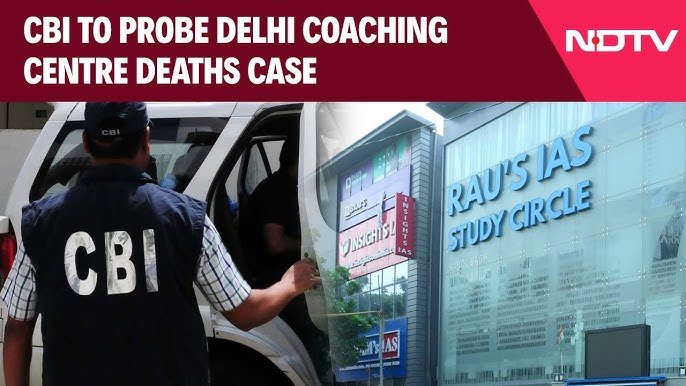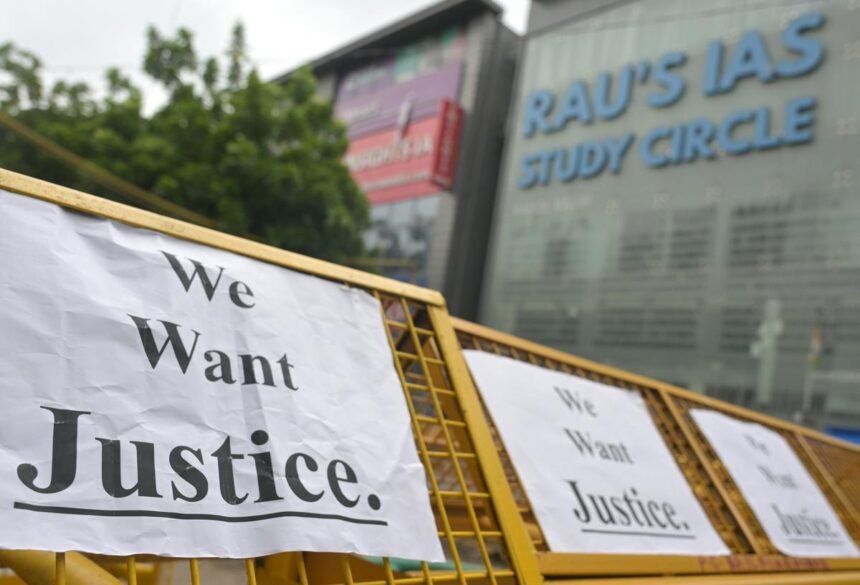In a significant development regarding the tragic Delhi coaching center incident, the Delhi High Court has transferred the investigation to the Central Bureau of Investigation (CBI). This decision highlights serious concerns about the adequacy and integrity of the initial probe conducted by the Delhi Police. This follow-up blog delves into the reasons behind this critical move, the implications for the ongoing investigation, and the broader legal and social impacts.
Background of the Case
On a fateful day, three UPSC aspirants lost their lives due to severe flooding in the basement of a coaching center in Delhi. The Delhi Police promptly launched an investigation and arrested seven individuals. Among the arrested are four owners of the basement and one individual accused of reckless driving, which reportedly contributed to the damage of the building’s gate, exacerbating the flooding situation.
Previously, these arrests were based on various sections of the Indian Penal Code (IPC), addressing negligence, endangerment of human life, and potential culpable homicide. The initial blog outlined these charges and the relevant legal provisions in detail, providing a comprehensive understanding of the legal grounds for the arrests.

Transfer to CBI: Reasons and Implications
The Delhi High Court’s decision to transfer the case to the CBI stems from several critical lapses identified in the Delhi Police’s investigation. During a recent hearing, it was revealed that the investigation officer had not even obtained the sanction plan of the building—a fundamental requirement for a thorough investigation. The court expressed its dissatisfaction with the manner in which the Delhi Police had conducted the probe, leading to the transfer to the CBI to ensure a more rigorous and unbiased investigation.
Key Points from the Court Hearing:
- Lapses in Initial Investigation:
- The Delhi Police failed to secure essential documents, such as the building’s sanction plan, which is crucial for understanding the structural aspects contributing to the flooding.
- The Acting Chief Justice of the Delhi High Court criticized the inadequacy of the investigation, highlighting the lack of proper procedural adherence.
- Need for Unbiased Investigation:
- The High Court emphasized the need for an impartial investigation to remove any doubts regarding the probe’s integrity.
- By involving the CBI, an agency known for its expertise and neutrality, the court aims to ensure a comprehensive and unbiased investigation.
- Accountability and Justice:
- The court’s decision is also a step towards ensuring that all responsible parties are held accountable.
- The transfer to the CBI reflects the court’s commitment to justice for the victims and their families.
Detailed Reasons for the Transfer:
- Inadequate Investigation by Delhi Police:
- The Delhi Police’s investigation was deemed insufficient due to the failure to acquire necessary documents and properly analyze the incident’s root causes.
- The police were unable to provide satisfactory explanations or evidence regarding the building’s structural integrity and the maintenance of safety measures.
- Judicial Dissatisfaction:
- The court expressed clear dissatisfaction with the progress and quality of the investigation, noting several procedural lapses and shortcomings.
- The Acting Chief Justice pointed out the lack of thoroughness in the investigation, which raised concerns about potential biases or oversights.
- Ensuring Comprehensive Investigation:
- The High Court determined that the CBI, with its specialized expertise and resources, would be better equipped to conduct a detailed and unbiased investigation.
- The court’s aim is to ensure that all angles are thoroughly explored, and any culpable parties are brought to justice.
Legal Framework and Responsibilities
The transfer of the investigation to the CBI will involve re-examining the case under various sections of the IPC, as previously mentioned:
- Section 304A (Causing Death by Negligence)
- Section 336, 337, and 338 (Acts Endangering Life or Personal Safety)
- Section 304 (Culpable Homicide Not Amounting to Murder)
- Section 279 (Rash Driving)
- Section 427 (Mischief Causing Damage)
The CBI will now take over all documents and findings from the Delhi Police and conduct a fresh investigation, potentially uncovering new evidence or insights that were missed initially.
Broader Legal and Social Implications
The transfer of the case to the CBI has several broader implications:
- Strengthening Investigation Processes:
- This move highlights the importance of meticulous and transparent investigation processes, particularly in cases involving multiple fatalities.
- It sets a precedent for future cases, ensuring that lapses in initial investigations can be rectified by involving higher authorities.
- Public Trust in Judicial Processes:
- The High Court’s proactive stance reinforces public trust in the judicial system’s ability to oversee and rectify investigative shortcomings.
- It assures the public that justice will be pursued diligently, even if it requires shifting the responsibility to a more capable agency.
- Accountability of Public and Private Entities:
- The case brings attention to the accountability of various stakeholders, including property owners and municipal authorities, in ensuring public safety.
- The Municipal Corporation of Delhi (MCD) has been directed to upgrade and maintain storm drains to prevent similar incidents in the future.
- Preventive Measures and Policy Reforms:
- This incident underscores the need for stricter enforcement of safety regulations in public and private infrastructures.
- It may prompt policy reforms aimed at enhancing urban infrastructure resilience, particularly in flood-prone areas.
The Delhi High Court’s decision to transfer the coaching centre deaths case to the CBI marks a pivotal development in the pursuit of justice for the victims. This move reflects the court’s dedication to ensuring a thorough and unbiased investigation, holding all responsible parties accountable, and preventing such tragedies in the future. As the CBI takes over the probe, it is hoped that the investigation will shed light on the circumstances leading to the tragic incident and ensure that justice is served.
This follow-up blog aims to provide a comprehensive update on the ongoing case, highlighting the legal and social implications of the High Court’s decision. Stay tuned for further updates as the CBI progresses with its investigation.








It is always great to come across a page where the admin take an actual effort to generate a really good article